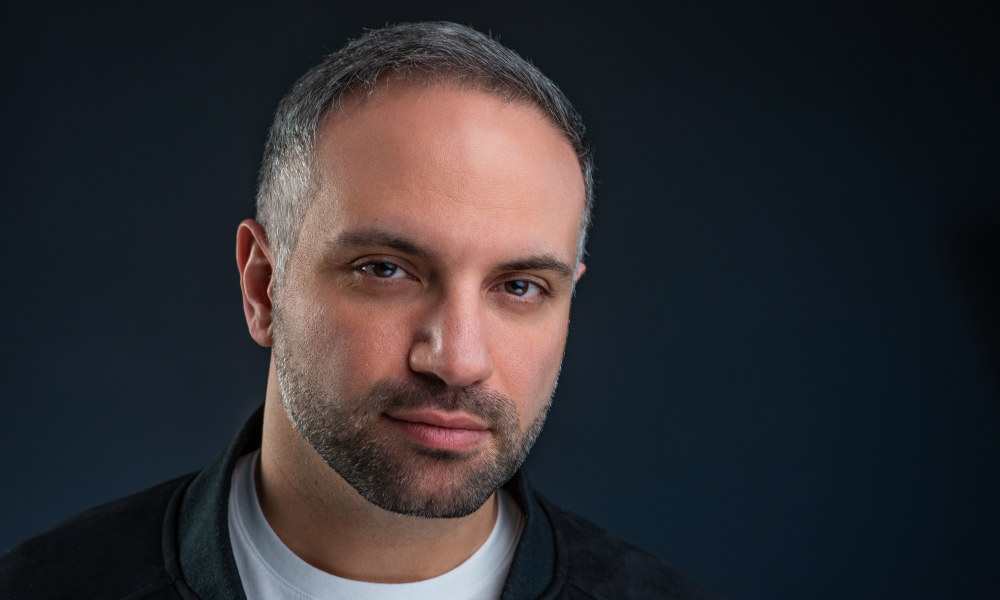Writer drew on his immigrant experience and Palestinian background

When Saeed Teebi found out he was shortlisted for the 2021 CBC Short Story Prize along with four other writers, he was thrilled – and surprised.
“It was an incredibly exhilarating experience, and shocking, because of how important the prize is in Canada,” Teebi, a Toronto lawyer who is Canada Cloud Counsel at Google, told Canadian Lawyer.
“I also felt it was quite an affirming thing, on various fronts: first from just simply as a writer, to have such a distinguished jury say ‘you're doing a good job’ was incredibly affirming. And as somebody who writes about the immigrant experiences, it was also really nice to be understood, and to feel like I have not wasted my time explaining things to an audience that may not get it. People got it, which is really nice.”
And although he didn’t win the prize, who was announced on Thursday, Teebi says he was honoured to have been shortlisted for it. This contest has existed for 30 years, he says, and a few of the winners have been great names in Canadian literature, including Michael Ondaatje and David Bergen.
The story, entitled “Her First Palestinian” – and the first story Teebi has had published, on the CBC Books website -- concerns a Palestinian immigrant to Toronto, the narrator, who becomes involved with a woman (a lawyer, as it happens) “who essentially takes up his country’s cause as her own,” he says. “She becomes in love with the idea of campaigning on behalf of Palestine, and does many things to raise awareness of Palestinians, and this is an unexpected feeling for him. Palestine, in the West, is a difficult cause.”
Yet the narrator’s girlfriend becomes “so wrapped up in her crusade on behalf of Palestine that he feels almost as if he doesn’t deserve to be part of her life. As an immigrant, he feels less Palestinian than those in Palestine.” The girlfriend then visits Palestine and takes a client there, and wants to spend more time there – perhaps, the narrator suspects, to spend more time with this client, “her first Palestinian.”
The key aspect of the story, says Teebi, “is how nice it feels, as an immigrant, to have an ally, … somebody to fully understand your background, and is completely invested in something that maybe, as an immigrant who's trying to fit in with society, you may not want to emphasize about yourself. Immigrants often talk about how they're Canadian, rather than [as] people from where they are originally.”
Teebi’s own background reflects that of his protagonist. Born to Palestinian parents in Kuwait, he lived for some time in the United States before moving to Montreal with his family in 1993, at the age of 15, and then relocating to Toronto about five years later. After working in bioinformatics for several years he attended law school, earning a J.D. (Common Law) from the University of Ottawa in 2012. He was called to the bar of Ontario the following year, and went to work for Norton Rose Fulbright Canada LLP, where he had also summered and articled.
He joined Google Canada as an associate corporate counsel in 2019, where he drafts and negotiates contracts with Google Cloud Platform enterprise customers.
In his current job, although he’s busy, “I had a little more control over my time,” Teebi says. “What made me put pen to paper is the pandemic; at the start of it last year, when you don’t have to commute every day, when you’re at home, and have this extra time,” he had the opportunity to return “to what I loved before,” which was creative writing.
“I love being a lawyer, and it’s the main art of my identity … but I also wanted to write.”
Teebi was interested in literature and writing from high school, and “fostered that a little bit through my university years,” which included working as an editorial consultant at Ryerson University’s Modern Literature and Culture Research Centre while at law school. But it wasn’t something he pursued seriously; “at the time, I thought I was lacking in sufficient life experience to write in a way I wanted to.”
Working in commercial law, he “was so busy that [writing] wasn’t something I thought about coming back to.” But with more time now on his hands, he set about to write every day, for an extended period of time, and has nearly enough for a collection of short stories. His writing frequently engages the immigrant experience and his Palestinian background.
His advice to others wishing to publish fiction, or a book, is to get into a regular writing habit.
“Especially as lawyers, we’re incredibly busy all the time,” he notes. “My best advice would be to get in the habit of writing every day.” Even allocating a small amount of time every day is important: “output doesn’t matter, as long as there is that muscle memory of producing something; then in no time it will be just part of what you do, and you’ll start to identify as a writer, and you'll produce your work.”
As well, “I think every writer has to find what excites them, and makes them want to write.” Writing about what you know is fine, but writers don’t need to be restricted to that; what’s important is to be passionate about the subject. “If that’s space aliens or end-of-days type stuff, then absolutely, write about that!”










